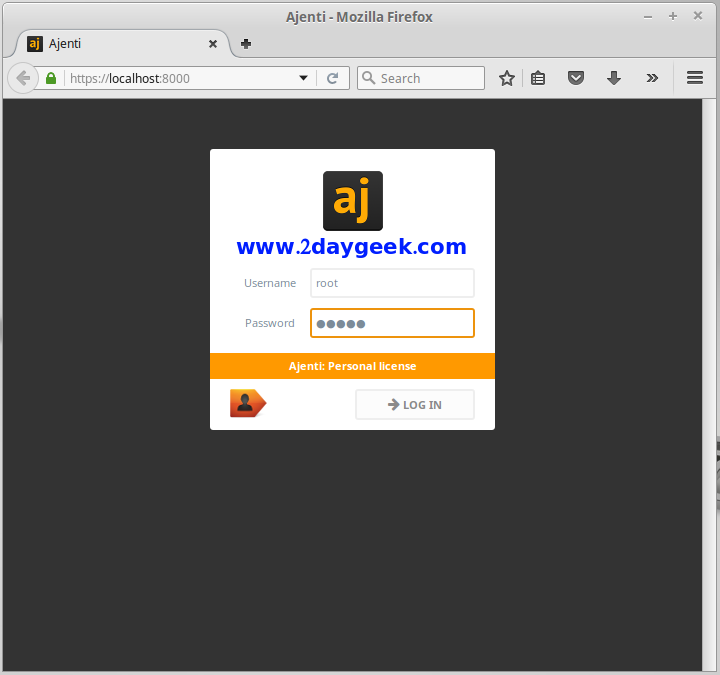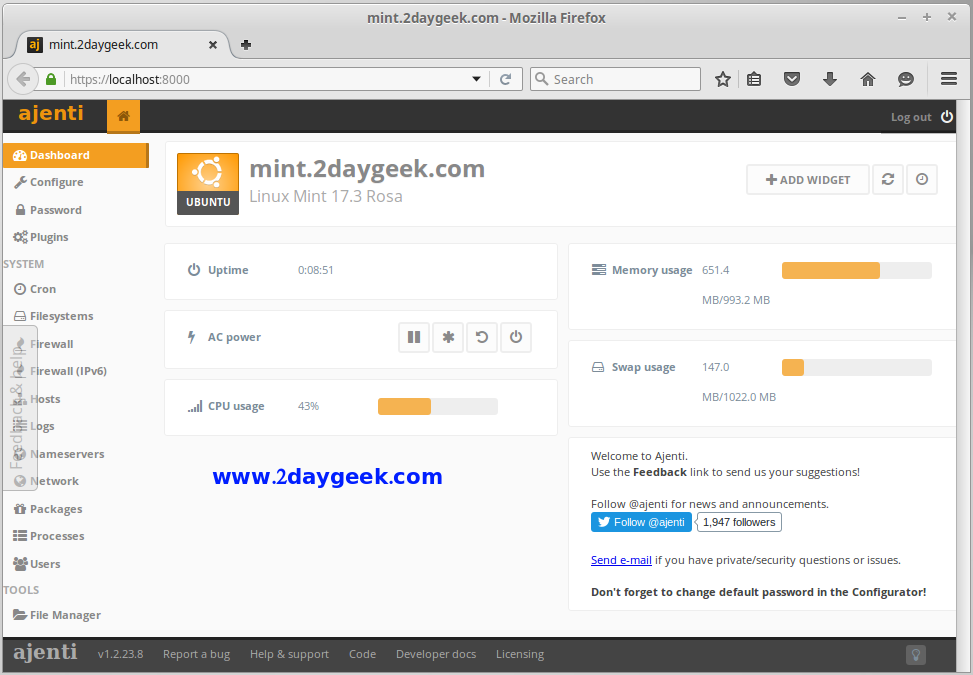Ajenti is a Free, open source, web-based control panel (GUI) for Linux server (Ubuntu, Debian, CentOS, RHEL). Ajenti is similar to Webmin module which will help server administrator to manage the remote server without headache. It’s lightweight, powerful & responsive web interface compare with webmin, Ajenti included lots of plugins for system and software configuration, monitoring and management purpose. Through Ajenti plugin we can install/manage all the major services such as web server, mail server, dns, Network monitoring service, Cron, File System, Firewall, MySQL, Samba, FTP, Squid, etc..,.
Ajenti won’t damage your existing configuration or tell you how to do your job. Preserves config structure and comments. Easily extensible using Python. Plugin development is fast and pleasant with rich APIs. We can easily manage VPS and Dedicated servers using Ajenti.
1) Install Ajenti on CentOS/RHEL
We can easily install Ajenti on CentOS/RHEL 6 & 7 using auto installer.
[For CentOS/RHEL 6] # curl https://raw.githubusercontent.com/ajenti/ajenti/1.x/scripts/install-rhel.sh | sh [For CentOS/RHEL 7] # curl https://raw.githubusercontent.com/ajenti/ajenti/1.x/scripts/install-rhel7.sh | sh
1a) Install Ajenti on CentOS/RHEL
Alternatively we can easily install Ajenti on CentOS/RHEL 6 & 7 using rpm package. Make sure you should enable EPEL repository before proceeding Ajenti installing through rpm package for dependencies.
[Install Ajenti Repo] # rpm -Uvh http://repo.ajenti.org/ajenti-repo-1.0-1.noarch.rpm [Make a Cache] # yum makecache [Install Ajenti] # yum install ajenti [For SysVinit System] # service ajenti restart [For Systemd system] # systemctl restart ajenti.service
Allow Ajenti panel port on Firewall.
[Allow Ajenti panel port on CentOS/RHEL 6] # iptables -A INPUT -p tcp --dport 8000 -j ACCEPT [Allow Ajenti panel port on CentOS/RHEL 7] # firewall-cmd --permanent --zone=public --add-port=8000/tcp # firewall-cmd --reload
2) Install Ajenti on Debian
We can easily install Ajenti on Debian systems 6,7 & 8 using auto installer.
[For Debian 6,7 & 8]
# wget -O- https://raw.github.com/ajenti/ajenti/1.x/scripts/install-debian.sh | sh
2a) Install Ajenti on Debian
Alternatively we can easily install Ajenti on Debian systems 6,7 & 8 using Ajenti repository package.
[Add repository Ajenti key] $ sudo wget http://repo.ajenti.org/debian/key -O- | apt-key add - [Add repository] $ sudo sh -c "echo 'deb http://repo.ajenti.org/debian main main debian' >> /etc/apt/sources.list" [Install Ajenti] $ sudo apt-get update && apt-get install ajenti [For SysVinit System] $ sudo service ajenti restart [For Systemd system] $ sudo systemctl restart ajenti.service
3) Install Ajenti on Ubuntu
We can easily install Ajenti on Ubuntu systems 12.04 to latest using auto installer.
[For Ubuntu 12.04 to latest]
$ sudo wget -O- https://raw.github.com/ajenti/ajenti/1.x/scripts/install-debian.sh | sh
3a) Install Ajenti on Ubuntu
Alternatively we can easily install Ajenti on Ubuntu systems 12.04 to latest using Ajenti repository package.
[Add repository Ajenti key] $ wget http://repo.ajenti.org/debian/key -O- | sudo apt-key add - [Add repository] $ sudo sh -c "echo 'deb http://repo.ajenti.org/debian main main ubuntu' >> /etc/apt/sources.list" [Install Ajenti] $ sudo apt-get update && apt-get install ajenti [For SysVinit System] $ service ajenti restart [For Systemd system] $ systemctl restart ajenti.service
When you run auto installer script, you will see the screen similar like below.
% Total % Received % Xferd Average Speed Time Time Time Current
Dload Upload Total Spent Left Speed
100 432 100 432 0 0 1220 0 --:--:-- --:--:-- --:--:-- 1223
:: Adding EPEL repo
Retrieving http://download.fedoraproject.org/pub/epel/beta/7/x86_64/epel-release-7-1.noarch.rpm
curl: (22) The requested URL returned error: 404 Not Found
error: skipping http://download.fedoraproject.org/pub/epel/beta/7/x86_64/epel-release-7-1.noarch.rpm - transfer failed
:: Adding Ajenti repo
Retrieving http://repo.ajenti.org/ajenti-repo-1.0-1.noarch.rpm
Preparing... ################################# [100%]
Updating / installing...
1:ajenti-repo-1.0-1 ################################# [100%]
:: Installing package
.
.
.
.
Restarting ajenti (via systemctl): [ OK ]
------------------------------------------------
Now start Ajenti with 'service ajenti restart'
Ajenti will listen on HTTPS port 8000 by default
Default username : root
Default password : admin
.
.
.
Installed:
ajenti.noarch 0:1.2.22.13-1
.
.
Complete!
:: Done! Open https://:8000 in browser
Note : See above for default username and password.
4) Access Ajenti
Navigate your browser to https://SERVER-IP:8000/ or https://SERVER-HOSTNAME:8000/ and enter your login details User Name : root & Password : admin to get into the Ajenti.

Home, Dashboard.

Enjoy…..)



